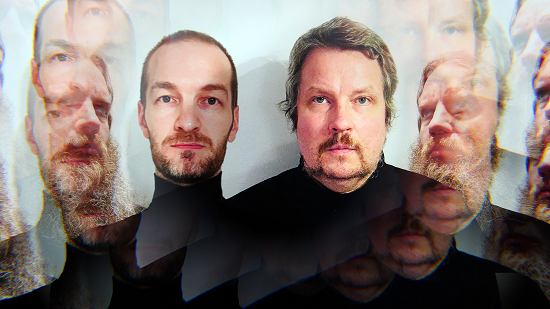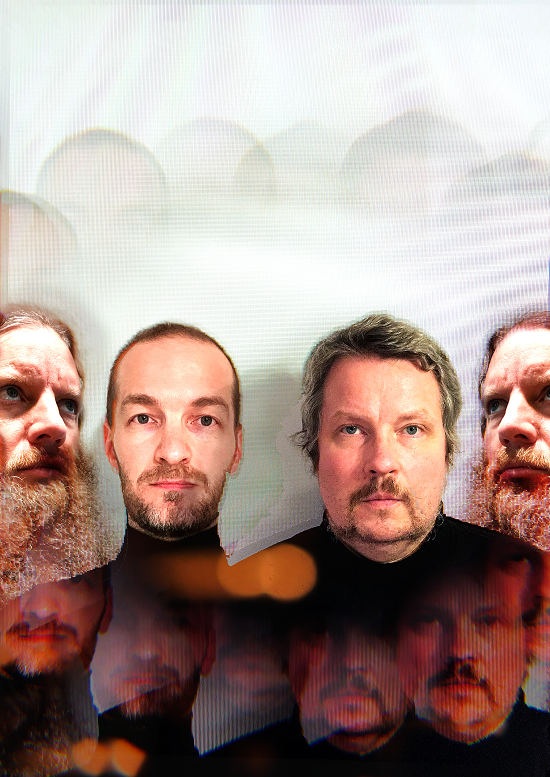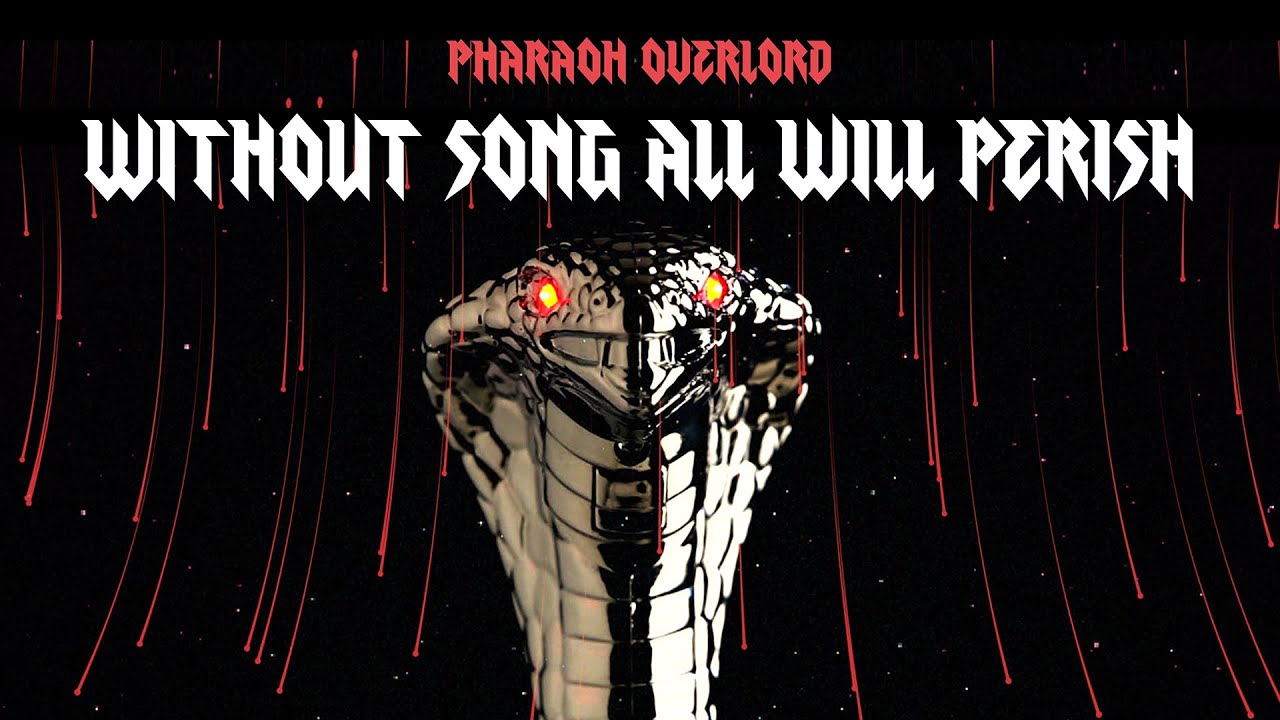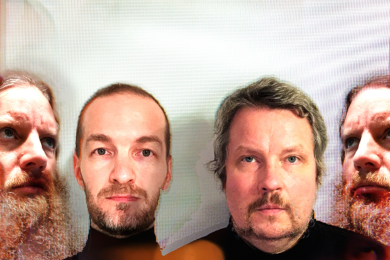Photos courtesy of Rocket Recordings
Pharaoh Overlord’s new album is a bizarre and brilliant thing, a record of pure energy that smashes ugly, guttural vocals (courtesy of frequent collaborator Aaron Turner of Sumac, Isis and Old Man Gloom) with a dollop of Italo-disco shimmer and relentless psych-industrial EBM thumps. It’s the second LP in a row the project’s released with just Tomi Leppänen and Jussi Lehtisalo at their core, and a sonic expansion on last year’s supercharged krautrock opus 5. Where that album saw the two musicians, who also play in constantly-evolving Finnish greats Circle, take their cues from early Kraftwerk (evidenced by its distinctly Ralf Und Florian album cover), 6 takes that gravity and adds a potent dose of sunny American gloss.
“When we realised that together we look like Steve Jobs and Jerry Garcia, we threw in influences from the West Coast, the enthusiasm of the early Apple Computer and the Grateful Dead. Our aim was to make ‘joyful noise’ with the minimum equipment,” Leppänen tells tQ via email. In its over-the-topness, Pharaoh Overlord has always been a project with which they can dive headfirst and unabashed into music’s more exuberant climes, from their early work’s indulgent stoner-rock pomp, to 2011’s hair metal LP Out Of The Darkness for which they added an umlaut to their name. Their first to be released on Rocket, 6 feels special even among this wild discography, one of the finest they’ve ever put out whether with Pharaoh Overlord, Circle, or anything else.
To find out more about one of the records of the year, how Pharaoh Overlord have evolved under lockdown, how Italian architecture collective the Memphis Group influenced their new material, and more, tQ spoke to Leppänen via email.
tQ: How would you compare 6 to 5? How have things changed for you in terms of creative focus?
Tomi Leppänen, Pharaoh Overlord: Both of the albums were born out of happy accidents and practical issues. In early 2019, Pharaoh Overlord was invited to support Sleep on their European tour that fall. At that point we were still six people with three guitars in the line-up. We found that the timing was not right for most of the band members to go on tour for weeks. Jussi, our sound man Antti and I were able to go, so we decided to “hijack” the band and do the tour as a duo. This also returned the band to the original line up of what it was when we started 20 years ago in 2000.
TL: To make sure we didn’t just repeat what we had already done with Pharaoh Overlord, we made a concept for this new line-up. This made the transformation easier for us because all we had to do was to follow these “brand” guidelines and play along. We wanted to be a mixture between DEVO, D.A.F. and Kraftwerk. When we realised that together we look like Steve Jobs and Jerry Garcia, we threw in influences from the West Coast enthusiasm of the early Apple Computer and the Grateful Dead. Our aim was to make “joyful noise” with the minimum equipment. On tour we found ourselves to be the most hassle-free support band in the world who behave like gentlemen, play loud, and load out before the last note has faded on the stage. So the album 5 and the following tour with Sleep came out of these thoughts and findings, and also set the mood for the future of this line-up.
The planning of the album 6 started when we got the invite to join OM on their 2020 European tour in May. It happened to be that also Aaron’s band Old Man Gloom was about to tour Europe with us in June, so of course we couldn’t resist the idea that if we make an album with him then we could also perform the songs with Aaron live.
How did the pandemic impact your creative projects? Were you able to meet and record in person for this album?
TL: We recorded most of the album before the pandemic, in January 2020, so we got to make it in person. Only Aaron’s vocals were recorded by him in the US. Originally the album was set to be released in May, but these tours with OM & Old Man Gloom got cancelled and the release date got moved. So we gave the album a second listen and did some more production, adding some details. I think we decided to make the whole album with the vocals then, instead of making it partly instrumental. So in some way the pandemic did influence the sound of the album.

I know Aaron made some contributions to 5, but his vocals are far more prominent here. Can you tell me more about your creative relationship with Aaron, and why you decided to get him involved this time around?
TL: We have great respect for Aaron and his art. Our friendship with him started in 2006 at the Supersonic Festival in Birmingham. Since then we have toured with his bands, he has collaborated with Circle and Pharaoh Overlord, and Aaron’s label SIGE has released the US vinyl version of our album Lunar Jetman. We also have a hardcore punk band with him called Split Cranium, that has made two albums so far. Aaron is an integral part of the family, always delivers the best and is also very easy to work with, so he was a natural choice.
I’m interested in the Italo-Disco influence on this album. Can you tell me more about your relationship with that music?
TL: When we started to make this album, we didn’t really have any musical concept or plans. The only plan was practical, to make it so that we could play it live as a duo or as a trio when Aaron was available. With the album 5 we had started to work and produce together as the Pharaoh Overlord Synthesizer Club and have since been adding more synths to everything we touch, so with this album we changed our perspective from a band to a production team.
TL: It’s very interesting that people hear a strong Italo influence on the album, as Italo is a fascinating genre, it’s kind of a gateway genre to more pure or serious electronic music. It’s very accessible and combines the futuristic electronic production with the catchiness of a chart pop music. It’s also very functional music, the repetitive pulsating rhythm forces you to dance.
On 6 the Italo influences must have something to do with the mid-tempo of the songs, the slightly melancholic melody lines or the synthesiser & drum machine choices we’ve made. Of course, we are also big fans of Giorgio Moroder and Patrick Cowley, the happy melancholy of this music speaks greatly to us. But luckily we’re not capable of making any ‘pure’ genre music, so the angle on this album is more of a postmodern world of different waves and cultural layers than a pure Italo production. Another kind of influence from Italy though, on a spiritual level at least, could be the Italian design & architecture movement the Memphis Group, that was said to be a mixture between Bauhaus and Fisher-Price.
How did the Memphis Group influence you?
TL: They questioned the traditional idea of functionality first in design, and instead made ambiguous products that were between art and design. At the time it was first received as ugly and impractical, but the playful yet rebellious attitude and the idea of mixing high and low is still very inspirational and was totally ahead of its time.
I’ve seen your early Pharaoh Overlord albums described as an ‘outlet’ for your love of stoner rock, and I’ve also seen Out Of The Darkness described as a ‘tribute’ to 80s metal. Is there an aspect of paying homage to some of your favourite music on this album too?
TL: The base of Pharaoh Overlord will probably always be in the musical element of repetition and the experimental spirit and the legacy of CAN. This is the DNA of the band that we then try to collide or crash against different ideas and different people on different albums. In a way the people we work with define the current output of the band. With Out Of The Darkness that was made under the moniker Pharaoh Overlörd in 2011, we collaborated with a genuine 80s hair metal guitarist and vocalist Jussi Kangas, and he naturally set the strong mood and theme for the album. Siluurikaudella was our take on the modern improvisational music, and it was based on different notation systems.
TL: This album is heavily influenced by the experiments and findings we have made as the Pharaoh Overlord Synthesizer Club. By making these different line-up combinations or strict musical systems and rules we try to make sure that there’s always an element of surprise that we can’t control. Or an element that controls us and prevents us to lean on our past too much.
Pharaoh Overlord’s discography is incredibly varied, but is there anything that you believe all of the albums the project has released have in common with one another?
TL: A big amount of randomness is always present, no matter how strict the concept or plan we have. We are very open to different surprising conclusions and always make the best of what we have. A certain playfulness is always around, we don’t seem to take things too seriously.
What does Pharaoh Overlord allow you to do that Circle does not?
TL: Both bands are quite flexible when needed, but decision making is really quick with this small line-up of Pharaoh Overlord. It’s like Pharaoh Overlord’s ‘Just Do It’ to Circle’s ‘Think Different’.
6 is out on November 27 via Rocket Recordings. You can pre-order it on CD and LP here.




